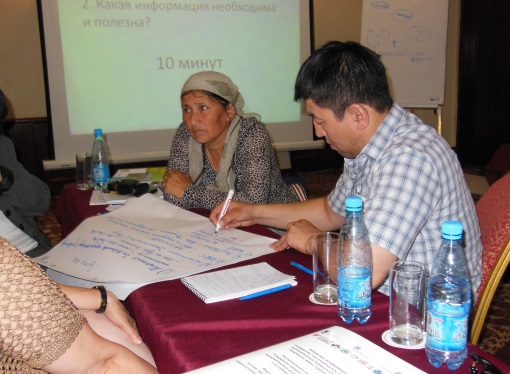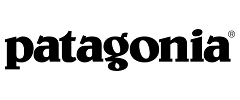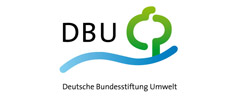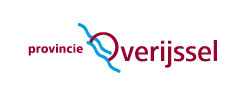Empower Women, Benefit for All – Central Asia Conference on 2 and 3 July in Bishkek
28.07.2014 |

Claudia Wendland, coordinator of the Kyrgyz EWA programme welcomed the participants and presented the socio-economic study for Kyrgyzstan. The results of the study show the need to improve livelihoods in the rural areas in terms of WASH and to create an environment for women to set up agricultural and processing businesses.
Women’s Livelihood Improvement
The Kyrgyz partners KAWS and CAAW presented their results in terms of improving water and sanitation conditions to decrease the daily burden for women in rural areas. Through applying the Water and Sanitation Safety Plan (WSSP) methodology, the awareness for water quality and safety could be raised among the local population in Osh and Bokonbaeva (Issyk Kul). Ecosan trainings were carried out in order to promote sustainable sanitation as well. The comfort and improved hygienic conditions of the urine diverting dry toilets (UDDT) are especially appreciated by women.
Women´s Economic Independence
MehrShavkat from Kyrgyzstan shared their experiences on women’s self help groups which were trained on new agricultural activities and who do joint marketing. In the framework of the project markets were analysed showing which products are most in demand and which possibly generate the most profit. MehrShavkat also runs a credit programme providing credits to selected women once they submitted a business plan; vulnerable women who have many children and/or have a migrant husband are the focus of this action. In order to provide women with more time to work, a kindergarten was established by women deputies.
The Tajik partner Youth Ecological Centre (YEC) reported about trainings for women groups on sustainable agriculture and on the development of business plans. A beneficiary (leader of a resource centre) mentioned that women gained more confidence within the time of the project, e.g. they started applying for licences in order to officially being able to process fruits and vegetables. The other Tajik partner ASDPNau shared their successes of their partner women development centres in gaining new jobs: the tailors of one centre were asked to sew the collection of schooling uniforms for Tajik pupils which is a big success.
Women’s Participation in Local Decision-Making
One main aim of the EWA project is to promote women to enter decision-making processes. Most partners confirmed that this is still a big challenge, in particular in Tajikistan. Tajikistan with strong patriarchal structures and a growing religious influence has particularly bad records in terms of women in decision-making positions. Kyrgyz partners also reported about the growing influence by religious groups on society impacting on women’s rights. However, the Kyrgyz membership organisation KAWS achieved that a woman after having worked on the board of the water users’ union (CDWUU) was elected as a deputy to the local council. A representative of CAAW said: “We try to develop leaders in the women’s self help groups; this is how they grow influential within their communities and how they can develop their leadership potential. Women need to be recognised as active “players” by local governments.” In October 2014, elections are due in Kyrgyzstan, therefore trainings for women on leadership are planned.
In Kazakhstan, not an EWA project partner country, NGOs are working on women’s empowerment regarding climate change issues. To strengthen institutional CSO capacities on this issue a regional platform was established recently.
Gender Sensitive Legislation and Policy Making
Partners in Tajikistan and Kyrgyzstan are working to sensitise policy levels and legislation regarding gender issues. STA from Kyrgyzstan presented their research on gender & water and sanitation, which has already been introduced to line ministries and parliamentarians. In Tajikistan, the paper on “women and farming” highlighting the problem of access to land for women is about to be finalised and will be presented nation wide in a roundtable meeting in the beginning of October 2014.
Recommendations for Policy Work
In separate working groups, the participants discussed and proposed recommendations for the political work in the EWA project focussing on the areas of gender & rural development, gender & water and sanitation and gender & climate change. These recommendations will be used as background paper for the upcoming policy work in the EWA program by all Central Asian partners. See here.
The participants appreciated very much the sharing of experiences between Kyrgyz, Tajik and Kazakh partners, they noted that this conference was the first time since many years that civil society organisations from 3 Central Asian countries have come and worked together so productively: “this was something they had missed”.
Central Asian Civil Society Networking
The participants discussed the need for bringing a stronger joint voice from Central Asian civil society, to improve national strategies on gender & climate change, gender & sustainable development, gender & water and sanitation, women’s rights to land, amongst others. They also noted the need for sharing best practices, tools, technologies, business concepts and funding opportunities.
The willingness was expressed to further strengthen the cross-border cooperation, therefore different options were discussed how continued networking could be best organised with the little resources available. The ideas will be further developed in the coming months as follow up.

































